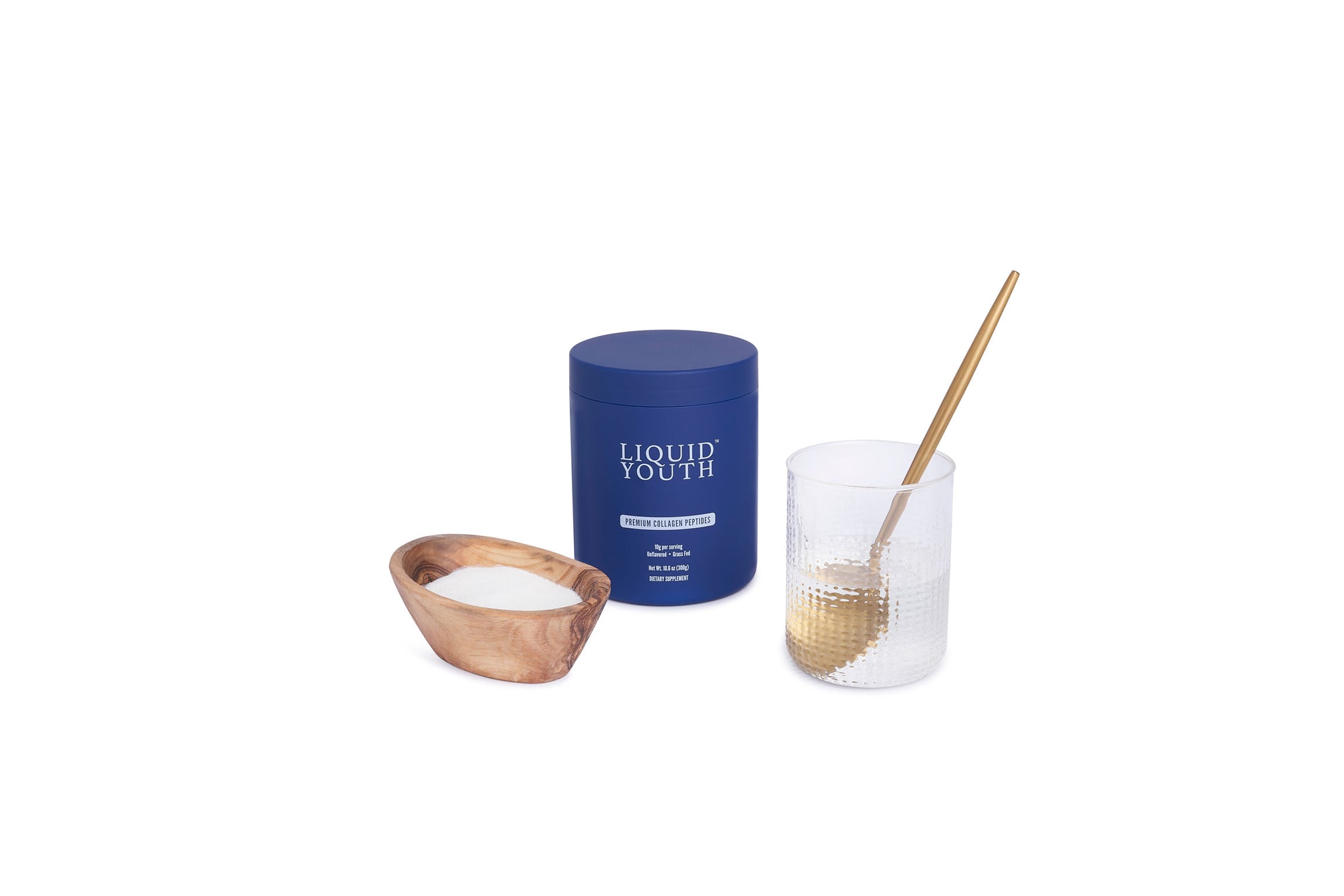Collagen Peptides for Sleep: A Natural Solution for Restless Nights

Collagen Peptides for Sleep Key Takeaways
· Collagen peptides can help reduce sleep disturbances, particularly by decreasing awakenings during the night.
· This study provides promising evidence that collagen peptides might be a helpful natural supplement to improve sleep quality in physically active individuals.
The Complete Guide to Collagen Peptides for Sleep
Collagen peptides, typically known for promoting skin elasticity and supporting joint health, may also hold the key to more restful nights. Sleep is an essential component of our health. Yet, many Americans stay up late, trying to squeeze in more work or spend time with family and friends. When the weekend rolls around, many attempt to catch up on sleep, often leading to inconsistent sleep patterns. While melatonin and tart cherry juice are popular supplements for improving sleep, new research published in the European Journal of Nutrition shows that collagen peptides may be another powerful tool in the quest for a good night's rest.1

The Science Behind Insomnia and Sleep Supplements
Before diving into the benefits of collagen peptides for sleep, it's helpful to understand what insomnia is and why so many people struggle with it. Insomnia is a sleep disorder characterized by difficulty falling or staying asleep. People with insomnia often experience daytime tiredness, mood swings, and reduced mental focus. It's more common than many realize, affecting between 5% to 20% of adults globally.2
Research has shown that certain nutrients can help regulate the sleep cycle. For example, tart cherries and kiwi contain melatonin, a hormone that promotes sleep. 3,4 Another key nutrient, glycine, helps calm the brain, lowers core body temperature, and helps you fall
asleep faster.5,6 In studies, taking 3 grams of glycine before bed improved sleep quality and reduced the time it takes to fall asleep. 7 The exciting news is that collagen peptides are rich in glycine, which is why they might work so well as a sleep aid. Collagen contains a variety of amino acids, particularly glycine, which is known to have a calming effect on the body.
The Study: Do Collagen Peptides Improve Sleep?
A recent study was designed to explore whether collagen peptides could improve sleep quality in physically active men who had sleep problems. People who exercise can often face more sleep disturbances due to post-exercise soreness, caffeine intake, and increased body temperature from exercise. Thirteen participants were given collagen peptides (15 grams a day) one hour before bed or a placebo for seven nights to see how it affected their sleep. A 15-gram dose of collagen peptides contains about 3.5 grams of glycine, which is an amount known to enhance sleep quality. 8

Collagen Peptides for Sleep: Improved Sleep Through Fewer Awakenings
One of the most striking findings from the study is that collagen peptides significantly reduced the number of awakenings during the night. Participants who consumed collagen peptides woke up less frequently compared to those who took a placebo. This reduction in nighttime disruptions is crucial because frequent awakenings can severely impact the restorative effects of sleep. By reducing these disruptions, collagen peptides provide a more restful night's sleep.
Beyond sleep quality, the study also assessed cognitive function, particularly the ability to focus and process information. Using a test called the Stroop Test, researchers measured how well participants could focus and react to visual stimuli. Those who consumed collagen peptides performed better on this test, showing greater mental clarity and attention the following morning.
This finding suggests that collagen peptides may not only help you sleep better but could also enhance your brain's ability to function optimally during the day. Given how closely sleep and cognitive performance are linked, these results highlight the potential of collagen peptides as a supplement for both body and mind.
Why Collagen Peptides Could Work for Sleep
The most likely explanation for a better night's sleep using collagen peptides lies in glycine, an amino acid found in high amounts of collagen. Glycine has been shown to have a calming effect on the brain, helping to reduce core body temperature and signal to the body that it's time to sleep.
Collagen Peptides for Sleep Versus Other Sleep Supplements
While many people rely on melatonin, magnesium, or even tart cherry juice to help them sleep, collagen peptides bring a unique benefit. Melatonin can result in morning grogginess, which may not be the best way to start your day.9
Collagen peptides, on the other hand, do not cause any type of morning grogginess, and this study found improved sleep. For those who can fall asleep easily but struggle to stay asleep, collagen peptides could be a game-changer. Moreover, collagen peptides offer additional benefits for joint and skin health, making them a more versatile supplement.

Practical Applications: How to Use Collagen Peptides for Sleep
If you're considering adding collagen peptides to your nightly routine to improve sleep, here are some practical tips:
When to Take It: The study recommends consuming 15 grams of collagen peptides about one hour before bed for optimal results.
How to Take It: Collagen peptides are typically available in powder form. You can mix them with water, tea, or any other beverage of your choice. They are tasteless and dissolve quickly.
Who Can Benefit: While this study focused on physically active men, the benefits of collagen peptides could extend to anyone who experiences sleep disruptions, especially if you're dealing with poor sleep quality due to stress, lifestyle factors, or aging.
Whether you're an athlete looking to recover better by improving sleep or simply someone who values a good night's sleep, collagen peptides could be worth adding to your nightly routine. More research will undoubtedly shed further light on these findings, but this study suggests collagen peptides are a safe and effective way to improve both sleep and cognitive performance.
Featured Products
References
1 Thomas, C. et al. Collagen peptide supplementation before bedtime reduces sleep fragmentation and improves cognitive function in physically active males with sleep complaints. Eur J Nutr 63, 323-335 (2024). https://doi.org/10.1007/s00394-023-03267-w
2 Roth, T. Insomnia: Definition, Prevalence, Etiology, and Consequences. Journal of Clinical Sleep Medicine 3, S7-S10 (2007). https://doi.org/doi:10.5664/jcsm.26929
3 Howatson, G. et al. Effect of tart cherry juice (Prunus cerasus) on melatonin levels and enhanced sleep quality. Eur J Nutr 51, 909-916 (2012). https://doi.org/10.1007/s00394-011-0263-7
4 Doherty, R., Madigan, S., Nevill, A., Warrington, G. & Ellis, J. G. The Impact of Kiwifruit Consumption on the Sleep and Recovery of Elite Athletes. Nutrients 15, 2274 (2023).
5 Gratwicke, M., Miles, K. H., Pyne, D. B., Pumpa, K. L. & Clark, B. Nutritional Interventions to Improve Sleep in Team-Sport Athletes: A Narrative Review. Nutrients 13, 1586 (2021).
6 Halson, S. L. Sleep in Elite Athletes and Nutritional Interventions to Enhance Sleep. Sports Medicine 44, 13-23 (2014). https://doi.org/10.1007/s40279-014-0147-0
7 YAMADERA, W. et al. Glycine ingestion improves subjective sleep quality in human volunteers, correlating with polysomnographic changes. Sleep and Biological Rhythms 5, 126-131 (2007). https://doi.org/https://doi.org/10.1111/j.1479-8425.2007.00262.x
8 INAGAWA, K., HIRAOKA, T., KOHDA, T., YAMADERA, W. & TAKAHASHI, M. Subjective effects of glycine ingestion before bedtime on sleep quality. Sleep and Biological Rhythms 4, 75-77 (2006). https://doi.org/https://doi.org/10.1111/j.1479-8425.2006.00193.x
9 Tuft, C. et al. Current Insights into the Risks of Using Melatonin as a Treatment for Sleep Disorders in Older Adults. Clin Interv Aging 18, 49-59 (2023). https://doi.org/10.2147/cia.S361519


















